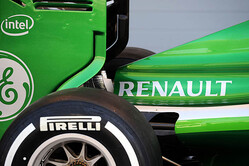


21/11/2014
NEWS STORY
 Tony Purnell, the FIA's former technical adviser, has launched a stinging attack on his previous employer for failing to cap the cost of the new V6 engines which were introduced this year and have contributed to the collapse of Caterham and Marussia according to an article in the Independent by Christian Sylt.
Tony Purnell, the FIA's former technical adviser, has launched a stinging attack on his previous employer for failing to cap the cost of the new V6 engines which were introduced this year and have contributed to the collapse of Caterham and Marussia according to an article in the Independent by Christian Sylt.
Last month Marussia and Caterham went into administration and, since then, the former has ceased trading whilst the latter has only made it to this weekend's season-ender in Abu Dhabi by calling on fans to invest money through crowd-funding. As Pitpass revealed last month, Caterham owes a total of £16.2m with the biggest creditor being Renault. It is no coincidence.
Renault is due £7.4m for supplying the 1.6-litre V6 turbo engines which are used by Caterham and come to a total annual cost of around £18m. It is double their V8 predecessors and is one of the biggest single expenses for teams in F1 where the average budget comes to around £140m every year.
The price of the engines was due to be limited to £5m in 2010 under plans developed by F1's teams association and the FIA. However, this fell by the wayside when the FIA attempted to introduce a £40m cap on team budgets. It was eventually dropped after eight of the teams threatened to leave the sport though, ironically, it would have kept their wheels turning now.
The cap was the brainchild of the FIA's former president Max Mosley and its technical adviser Tony Purnell who says "we were probably too ambitious. You can do it policy by policy and one policy would be to set the sale price of these new engines. It's a very small move, and people wouldn't really notice it, but it would be hugely important. Without doubt the engine bill used to be one of the biggest headaches for any small team and I'm sure it still is. It's a massive wedge of money. To me it is crystal clear that it is the FIA's job to do it."
It echoes comments from Formula One Management (FOM) boss Bernie Ecclestone who has been one of the biggest critics of the new smaller engines which were introduced to make F1 more environmentally-friendly. However, they have attracted widespread criticism for lacking the high-pitched screeching sound that their predecessors were famous for. "The biggest problem we have is this current power unit which we don't need and does nothing in the world for Formula One. It's expensive, in fact it's very expensive, and this is probably what has caused most of the problems," says Ecclestone.
Three of F1's smallest teams - Force India, Lotus and Sauber - recently wrote to Ecclestone to outline how much of their prize money goes on buying engines. The letter, which was signed by Force India's deputy team principal Bob Fernley and endorsed by the other two outfits, said that "70% - 80% of the FOM income has to be allocated to the engine. For us, as engine customers, the engine technology, i.e V6 or V8 turbo-charged or hybrid, is of much less significance, as opposed to engine manufacturers, who are using Formula One as a marketing tool to showcase high-end technology. Unlike manufacturer-owned teams, our core business is Formula One.
"Yet, we have no choice but to spend most of our income on the engine, and the remaining 30% is by far not enough to construct, enter and run a team over a twenty race season."
The three teams also suggested that another factor is F1's inequitable division of prize money, which gives a £65m bonus to the three leading teams: Ferrari, Mercedes and Red Bull Racing. However, this was implemented in 2013 when no teams went under, unlike this year. Purnell says it is not the only way the frontrunners are favoured as the lack of a limit to the price of the engines benefits leading teams like Mercedes and Ferrari which make them and sell them to the others.
"Selling engines is immensely profitable because once you have done all the research and development work, reproducing the thing costs a fraction of what you can sell it for. They are expensive items but they are not that expensive," says Purnell.
Engine costs are on track to accelerate further due to Mercedes' dominance. It has already won the Constructors' Championship and either Lewis Hamilton or Nico Rosberg will take the drivers' title for it this weekend. To try and catch up, Mercedes' rivals are pushing for the FIA to lift the freeze on engine development which is currently in place until 2020. If it is lifted it would allow the teams to develop new engines which in turn is likely to increase their price.
Purnell believes that a budget cap is needed to ensure the health of all teams but he says F1 is "a million miles off that... I've never really felt that there is actually much support for the position of getting a handle on costs... (Former Mercedes team principal) Ross Brawn put it beautifully to me. He said, 'you have got to understand, if you are given money to spend, you spend it and if your engineers can't spend it and aren't begging for more then get some new engineers'."